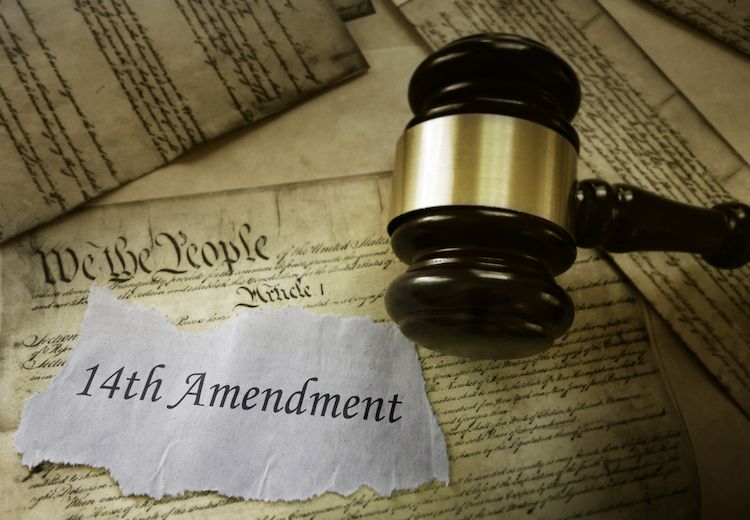Why Colorado judge kept Trump on ballot despite finding he engaged in insurrection

Image from Shutterstock.
Former President Donald Trump isn’t an “officer of the United States” who can be banned from office under the 14th Amendment for engaging in “insurrection or rebellion” against the U.S. Constitution, a Colorado judge ruled Friday.
Ruling after a five-day trial, Judge Sarah B. Wallace of Denver said Trump did engage in insurrection Jan. 6, 2021, but Section 3 of the 14th Amendment doesn’t apply, report CNN, Law360, Courthouse News Service, the New York Times and the Volokh Conspiracy.
At issue was whether Trump can be banned from the Colorado ballot under Section 3 of the 14th Amendment. It bars people from holding U.S. office if they engaged in insurrection or rebellion after taking an oath “to support the Constitution of the United States” as “a member of Congress, or as an officer of the United States, or as a member of any state legislature, or as an executive or judicial officer of any state.”
Wallace cited two reasons why Section 3 of the 14th Amendment doesn’t apply. First, the amendment lists several types of office holders who have taken constitutional oaths who would be banned from office as an insurrectionist, but it does not specifically list presidents. Second, the amendment applies to office holders who have taken an oath “to support the Constitution,” wording that does not track the presidential oath to “preserve, protect and defend” the Constitution.
Wallace considered whether Trump was an officer of the United States beginning at page 95 of her 102-page opinion, the Volokh Conspiracy pointed out in a post by Josh Blackman, a professor at the South Texas College of Law in Houston. Her decision embraces theories advanced partly by Blackman.
Wallace cited five constitutional provisions that used the phrase “officer of the United States” in a way that did not apply to a president. The appointments clause, for example, says a president “shall appoint ambassadors, other public ministers and consuls, judges of the Supreme Court, and all other officers of the United States.”
Another example is the impeachment clause, which says “the president, vice president and all civil officers of the United States shall be removed from office on impeachment for, and conviction of, treason, bribery or other high crimes and misdemeanors.”
Wallace spent much of her opinion considering whether Trump engaged in insurrection.
She considered the findings of the House select committee investigating the Jan. 6, 2021, U.S. Capitol attack.
“While Trump spent much time contesting potential biases of the committee members and their staff, he spent almost no time attacking the credibility of the committee’s findings themselves,” Wallace wrote.
Wallace also considered the testimony of Peter Simi, a professor at Chapman University, who has studied political extremism. He testified about a pattern of calls for violence by Trump. In one instance, for example, Trump told his supporters to “get [a protester] the hell out of here,” The protester was assaulted. At no point did Trump condemn violence by his supporters, Simi said.
“For example,” Wallace wrote, “violent far-right extremists understood that Trump’s calls to ‘fight,’ which most politicians would mean only symbolically, were, when spoken by Trump, literal calls to violence by these groups, while Trump’s statements negating that sentiment were insincere and existed to obfuscate and create plausible deniability.”
Wallace said Trump knew that he had lost the 2020 election when he posted on X, formerly known as Twitter, Dec. 19, 2020, “Statistically impossible to have lost the 2020 Election. Big protest in D.C. on January 6. Be there, will be wild!”
Trump’s encouragement Jan. 6 to “fight like hell” was “intended as, and was understood by a portion of the crowd as, a call to arms,” Wallace said.
The New York Times cited rulings by three other court on whether Trump could be banned from office under the 14th Amendment. None reached the issue that Wallace decided—whether Section 3 of the 14th Amendment applies to Trump.
The Minnesota Supreme Court ruled earlier this month that Trump could be on the primary ballot because the Republican Party can determine the candidates it wants to list. A New Hampshire case was also dismissed on procedural grounds, while a judge in Michigan said the issue is a political question that can’t be decided by the courts.
See also:
“Constitution bars Trump from presidency, 2 conservative law profs conclude in upcoming article”



